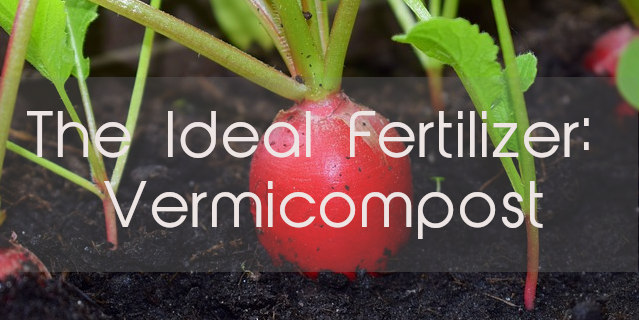Fertilizer. Fertile. Fertility. What do these words bring to mind for you?
Is it that harsh chemical smell and a heavy bag of who knows what? Or, is it visions of green and the ability to produce and reproduce?
Maybe you see and imagine your own landscape. Is yours lush, with an abundance of growth, flowers, and fruit? That is the image of a fertile landscape. And if yours isn’t, it could be. Want to know how? Do you want to know how without the use of toxins?!
By the time you finish reading this article, you’ll learn the natural way to boost life in your landscape. You’ll discover why using one perfectly sustainable superfood heals, protects, and improves the fertility of whole ecosystems.
You’ll see why worm compost is the ideal fertilizer for your home garden.
The Answers are Below
By nature, a good sign of a plant’s health and vigor is its ability to reproduce through seed production. From those come the seeds that start the next generation. When masses of flowers bloom or fruits hang heavy, we know things in the soil are going well.
However, there are times we think a plant is healthy when in fact it could do much more. Other times, the signs of distress are much more obvious. Plants with discoloration, few blossoms, distorted leaves and fruits, stunted growth, or parts dying off, usually tell a tale of what’s below.
It’s the ground beneath a plant that supports all that grows above. In fact, the vigor of a plant is directly related to the quality of its soil. Earth that has used up its supply of nutrients grows weak plants. These weak plants struggle to bloom, spread, or fend off stressors like disease and pollution. And even nutritious soil that is compact, dry, or waterlogged can only handle very few varieties.
Harmony without Harm
Thankfully, even parched and barren soils can be rescued. Any place you incorporate earth’s ideal fertilizer can become rebalanced and transformed. A dry and desolate part of your yard can become a vibrant and beautiful garden.
In our own yards and landscapes, there are many complex and underground systems whose balance is essential to our survival. Without that harmony, things begin to falter.
It starts at the microscopic level with billions of valuable bacteria. These microbes break down organic matter and feed larger organisms, like worms. The chain continues on up, as one supports the other, all life is connected.
Worm Tunnels: Making Connections of a Different Sort
I learned as a child that in the garden some bugs were good and some bugs were bad. Bees and ladybugs were left undisturbed and always, worms were treasured.
My mom would pull big fat ones out before they could slip into their holes. I’d get to hold them while she explained what made them special. She said each one of them had babies to take care of, but also that their smooth tunnels helped our plants grow.
She said that air and water flow through those underground tunnels delivering water and oxygen to roots. Little did she know what else was going on down there. As leaves and things fell to the earth, worms would eat the organic debris and deposit remains there in the dirt.
Those worm poop deposits, or casts, are the ideal fertilizer and soil amendment. Unfortunately, earthworms aren’t as productive in this area as Eisenia fetida, which aren’t native to the United States.
If only she had a worm composting set-up back then. She could have raised her own red wiggler worms for making compost. Then she wouldn’t have had to pay for harmful chemicals or heavy bags of sand and unsustainable peat moss!
More importantly, harnessing the power of compost worms would have reduced our waste, kept us safe from chemicals, and wouldn’t have cost a thing. Alas, Mom has her own worm bin now and feels great about being part of the “solution rather than pollution” life.
Why Else is Worm Compost the Ideal Fertilizer?
Being free and able to upcycle our trash is great for us humans, but what characteristics make it best for our garden soil too? There are almost too many reasons to describe it!
All Natural
Worm compost is made of 100% natural ingredients. In particular, worm casts offer high concentrations of readily available calcium, magnesium, nitrogen, phosphates, and potassium, plus minerals such as manganese, copper, zinc, cobalt, borax, iron, and carbon. This means that as the worm compost continues to break down, it adds everything your soil needs to grow healthy plants.
Slow-Release
Worm compost can be used effortlessly as a slow-release fertilizer. As natural rainwater falls to the earth it slowly filters through the soil dissolving particles of worm compost. The combination seeps repeatedly through the soil with each rain. In this manner, plants are fed continuously through the season.
Versatile Use
Worm compost is versatile. Various application methods allow for a range of uses year-round. Aside from being a slow-release fertilizer, using worm compost in the form of a tea makes it also a quick-release fertilizer. Inside or out, spring, summer, or even winter, there are ways to use worm compost for all you grow.
Root Support
Worm compost improves the structure, aeration, drainage, and water retention of soil. The composition of bedding mixed with worm casts is an ideal environment for plant roots. Air pockets throughout the loose material allow for oxygen and water to find their way through to roots. In addition, organic matter absorbs excess water without becoming too compact for drainage.
Bacterial Benefits
Worm compost teems with beneficial microorganisms. Inside the soil, these beneficial microorganisms (oxygen loving bacteria) continue to consume and break down organic material. These, in turn, provide food for larger organisms (like worms) who further add diversity, life, and activity to the soil and surrounding ecosystem.
Advanced Protection
One of the most interesting qualities of worm compost is its ability to effectively protect seeds and plants against fungal and bacterial diseases. Using worm compost leads to higher germination rate and resilience to pathogens. It’s the beneficial bacteria that destroy the ones that cause harm. Plants with high concentrations of “good” microbes have a greater survival rate in times of stress.
Eco-Friendly
Unlike chemical fertilizers that pollute our natural resources and cause illness for living creatures, worm compost supports the greater ecosystem. From the ground up, plants and animals benefit from naturally enriched soils. Water flows through worm compost without picking up toxins that will burn plants or end up in our drinking water. And with no foul odor from harsh fumes, worm compost supports clean air for healthy breathing.
Harvest Booster
Soil amended with 10-20% worm compost yields up to 25% more fruits and vegetables. Hormones in the natural fertilizer spur flower growth and fruit set. In addition, the quality of these blooms and fruits is improved. Thus, you end up with larger, more vibrantly colored flowers and larger, better-tasting fruits and vegetables. For specific ways to boost various annuals, perennials, and edible plants in your garden, read Worm Compost: Bringing Things into Full Swing All Spring.
As you can see, over time worm compost greatly enriches and improves the overall quality of the soil it is in. This pure and natural “miracle” will never harm our plants, our water, our air, or wildlife. It is the only soil amendment that can boast being safe for any plant, anywhere, at any time.
Choices
I hope you agree that worm compost is in a league of its own. Brand name fertilizers are just not the same. But sometimes it can be hard to be sure when there are so many choices at our fingertips. When it comes down to it, quality is what counts. Wouldn’t you agree?
So pass on commercially manufactured growth agents. Let compost worms take your trash and make it into something good. Dig it under or pour it over. No matter how you use it, worm compost will improve the fertility of your garden.
If you are just getting started and want a lending hand, check out Get Started Worm Farming. You can even get your first pound of worms shipped safely and securely to your door. And when you are ready to take your worm composting to the next level, combine it with purposeful gardening! Make the switch to worm compost, then watch and listen as your garden speaks of the healing beneath.
Happy worm composting!


Be the first to comment